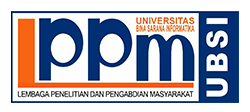PROSEDUR PEMESANAN DAN PENERIMAAN BAHAN PASTRY UNTUK KEGIATAN PRODUKSI DI HOTEL HILTON BANDUNG
Sari
Abstract - Pastry is one of the departments of the hotel to provide a dessert dish.variouscake and dessert should be produced by the pastry every day in accordance with the request of the banquet event order (BEO). To produce the cake and dessert pastry section requires the availability of the raw materials. The basic ingredients are obtained from the order process until receiving of the pastry. use of materials is also onr of the things that influence the availablility of pastry. However in the event booking process and receipt of materials often found obstacles. These barriers have a major on operational at the pastry Hilton Hotels Bandung. The method used was a case study which is a method that takes a particular object to be analyzed in depth by focusing on an issue. Based on the result of research regarding the booking procedure and acceptance of the pastry authors find the constraints, the first one is from suppliers could not send the raw materials at the time of red date or holiday. The second one is from internal parties Hilton that reducing the number of orders that have been submitted by the pastry and the distribution of materials that are not yet well-organized, because many raw materials pastry that is used along with other outlets. So often the materials ordered for pastry and even used by other outlets and causing the pastry to run out of raw materials.
Key words : Pastry, Order, Receipt, Raw Materials
Abstrak - Pastry merupakan salah satu departmen di hotel yang bertugas untuk menyediakan hidangan dessert. Bermacam - macam cake dan dessert harus diproduksi oleh bagian pastry setiap harinya sesuai dengan permintaan dari Banquet Event Order (BEO). Untuk memproduksi cake dan dessert tersebut bagian pastry membutuhkan ketersediaan bahan baku. Bahan baku tersebut didapatkan dari proses pemesanan hingga penerimaan bahan pastry. Penggunaan bahan juga merupakan salah satu hal yang mempengaruhi ketersediaan bahan pastry. Namun pada saat terjadi proses pemesanan dan penerimaan bahan, sering sekali ditemukan kendala. Kendala tersebut berdampak besar pada kegiatan operasional di pastry Hotel Hilton Bandung. Metode yang digunakan adalah studi kasus yaitu suatu metode yang mengambil suatu objek tertentu untuk dianalisa secara mendalam dengan memfokuskan pada suatu masalah. Berdasarkan hasil penelitian mengenai prosedur pemesanan dan penerimaan bahan pastry penulis menemukan kendala. Pertama dari pihak supplier yang tidak dapat mengirimkan bahan baku pada saat tanggal merah atau hari libur, kedua dari pihak internal Hilton yang mengurangi jumlah pesanan yang telah diajukan oleh bagian pastry dan pendistribusian bahan yang belum terorganisir dengan baik, karena banyak bahan baku pastry yang digunakan bersama dengan outlet lain, sehingga seringkali bahan yang dipesan untuk kegiatan pastry malah digunakan oleh outlet lain, dan menyebabkan pastry kehabisan bahan baku.
Kata kunci : Pastry, Pemesanan, Penerimaan, Bahan Baku
Teks Lengkap:
PDFReferensi
Arikunto, Suharsimi. 2006. Prosedur Penelitian Suatu Pendekatan Praktik. Jakarta : Rineka Cipta
Bartono, PH & Rufino, E.M. 2005. Food product management. Yogyakarta : C.V Andi Offset
Rahman, Abdul Arief. 2005. Pengantar Ilmu Perhotelan dan Restoran. Yogyakarta : Graha Ilmu
Satori, Djam”an dan Aan Komariah. 2010. Metodologi Penelitian Kualitatif. Bandung: Alfabeta
Sukmadinata. 2006. Metode Penelitian Pendidikan. Bandung : Rosdakarya
Suarsana. 2007. Siklus Pengadaan Barang. Yogyakarta : Graha Ilmu
Subagjo, Ajabd. 2007. Managemen Pengolahan Kue dan Roti. Yogyakarta : Graha Ilmu
Sulastiyono, Agus. 2011. Management Penyelenggaraan Hotel. Bandung : Alfabetha
Sutopo, HB. 2006. Metode Penelitian Kualitatif. Surakarta : UNS Press
Suwithi, Ni Wayan, dkk. 2008. Akomodasi Perhotelan. Jakarta : Direktorat Jendral Pembinaan Sekolah Menengah Kejuruan (PT. Macanan Jaya Cemerlang)
http://chefnhipaysproduct.wordpress.com/2012/10/15/pengertian-pastry/
(diunduh pada tanggal 19 – juni – 2014).
DOI: https://doi.org/10.31294/par.v1i2.162










